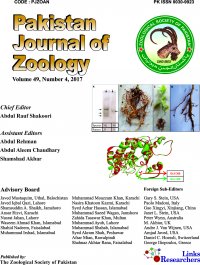Analysis of the GJB2 Gene and its Mutated Protein in Non-Syndromic Hearing Loss Patients of Gilgit-Baltistan
Analysis of the GJB2 Gene and its Mutated Protein in Non-Syndromic Hearing Loss Patients of Gilgit-Baltistan
Ejaz Ali and Nageen Hussain*
ABSTRACT
Pakistani population is unique for the study of recessive genetic diseases due to a higher rate of consanguinity and Hearing Loss (HL) is one of them that affects more than 466 million people worldwide; will increase to 900 million by 2050. GJB2 mutation is one of the main causes of hearing loss in different populations, including Pakistan, that encodes a gap junction protein involved in the homeostasis of the inner ear by recycling potassium ion. This research aimed to find out mutations in the GJB2 gene and its protein structure. Both control and patient samples were collected from Gilgit-Baltistan for DNA isolation and PCR was done by using a specific primer while sequencing was done by Sanger sequencing. Mutations were detected by Mutation Surveyor and BLAST. Protein structures of both control and mutated samples were constructed by PHYRE2 and visualized by the software PyMOL. The detected mutations were 380G>A (R127H), 457G>A (V153I), 36T>C (G12G), 496C>T (L166L), 650 delA and 79G>A (V27I). This study revealed that the prevalence of GJB2 mutations in hearing-impaired patients of Gilgit-Baltistan is 11.66 %. The mutation rate is higher as compared to other populations of Pakistan. This study can help deaf patients via gene therapy and also through drug designing.
To share on other social networks, click on any share button. What are these?










